Contents
What is a dental implant?
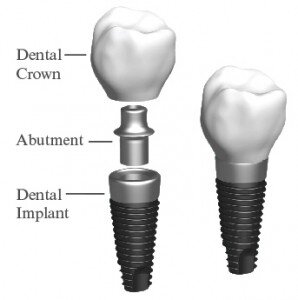 Dental implants are designed to replace a missing tooth, and specifically the root of it. A dental surgery would typically involve screwing it into the jawbone followed by the placement of an artificial crown on top that would resemble a natural tooth.
Dental implants are designed to replace a missing tooth, and specifically the root of it. A dental surgery would typically involve screwing it into the jawbone followed by the placement of an artificial crown on top that would resemble a natural tooth.
A conventional implant structure looks like this- in between the implant and the artificial tooth lay an integral part of the structure called an abutment. It serves as a firm connection between the crown (or a full set of fixed teeth per jaw) and the dental implant.
Dental implant surgery serves as a better alternative to removable dentures or dental bridges. The process, duration and overall scenario of implant surgery are strictly individual and would depend on the type and number of implants and the strength of the jawbone. Among the top benefits of implants is that in conjunction with the fixed teeth over them, they offer the looks and functionality of natural teeth.
History of dental implants
 The first sightings of implant-like structures date back thousands of years to different countries around the world. Among the most prominent ones are bamboo bolts from ancient China (4000 years ago), inserted into the jawbone to replace lost teeth with no roots. 2000-year-old similar structures of noble metal have been found in ancient Egypt as well.
The first sightings of implant-like structures date back thousands of years to different countries around the world. Among the most prominent ones are bamboo bolts from ancient China (4000 years ago), inserted into the jawbone to replace lost teeth with no roots. 2000-year-old similar structures of noble metal have been found in ancient Egypt as well.
Types of implants
Worldwide, research shows that there are over 100 different implant manufacturers. The most established implant companies are Straumann, BioHorizons and Nobel Biocare among others. All different brands have gone through extensive testing, research and development over the last 30 years hence their well-established names on the market. Wondering what features to consider when choosing among manufacturers? Here’s my own piece of mind- the more popular the brand, the better guarantee options and the easier it would be to find replacement parts. In the long run, if a particular part fails in a decade or so, you should still be able to find a substitute. On the contrary, smaller companies that offer cheaper implant options are in most cases with inferior quality of the materials and have far shorter testing history.
 Top 5 world-renowned implant brands that we work with at Dentaprime F3T:
Top 5 world-renowned implant brands that we work with at Dentaprime F3T:
- Straumann AG (Switzerland)
- DENTSPLY (USA)
- Ankylos (Germany)
- Bio Horizons (USA)
- TRI (Switzerland)
– Basal vs Conventional implants
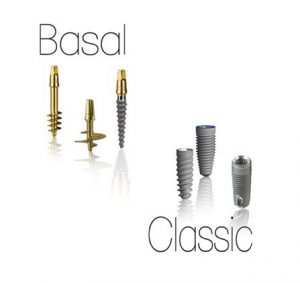 Basal implants consist of one piece and smooth surface and do not connect with the bone in any way. They are oftentimes chosen due to their low cost and the fact that using them would allow avoiding bone graft. However, there are risks involved during dental implantation, as they could hit a nerve and cause a permanent injury since they are placed deep into the jaw.
Basal implants consist of one piece and smooth surface and do not connect with the bone in any way. They are oftentimes chosen due to their low cost and the fact that using them would allow avoiding bone graft. However, there are risks involved during dental implantation, as they could hit a nerve and cause a permanent injury since they are placed deep into the jaw.
However, they are a short-term solution. There is a higher chance for the crown to break because they do not consist of two adjustable parts but one whole body which is adjusted with pliers (meaning it can cause bone damage throughout the process). On the other hand, conventional implants have two parts – implant + abutment and then the crown on top.
Dentaprime clinic works with titanium conventional implants only as they are considered to be the safest and most durable option.
– Titanium vs. Zirconia implants
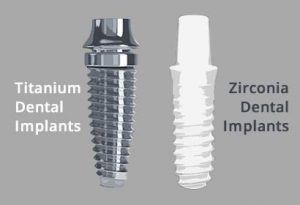 Titanium and Zirconia implants are both biocompatible and easily fuse with the jawbone. However, the latter is still being actively tested and researched and they offer a limited variety of components and designs compared to the titanium ones. Optimal results can be hardly achieved with zirconia implants yet, specifically when replacing several teeth or if positioned in the place of molars (at the back of the jaw) where the pressure is higher. This owes to the fact that titanium implants have 2 adjustable parts which serve well when angling is needed, as opposed to zirconia. The cost of zirconia dental implants is greater than titanium ones, which would make the overall price for implanted teeth more expensive.
Titanium and Zirconia implants are both biocompatible and easily fuse with the jawbone. However, the latter is still being actively tested and researched and they offer a limited variety of components and designs compared to the titanium ones. Optimal results can be hardly achieved with zirconia implants yet, specifically when replacing several teeth or if positioned in the place of molars (at the back of the jaw) where the pressure is higher. This owes to the fact that titanium implants have 2 adjustable parts which serve well when angling is needed, as opposed to zirconia. The cost of zirconia dental implants is greater than titanium ones, which would make the overall price for implanted teeth more expensive.
Titanium implant systems usually have a much greater variety of component options varying in angulation and size which is essential for the endurance and lifetime success of the implants. They have gone through extensive design improvements and innovations; can last 20 years and more resulting in a long-term success rate of 94-97%.
Zirconia is far less prone to resilience which in turn could end in micro ruptures. Nevertheless, it is also quite durable. They could also be an alternative option for patients allergic to titanium (which happens in less than 0.6% of the population)
Benefits of dental implants
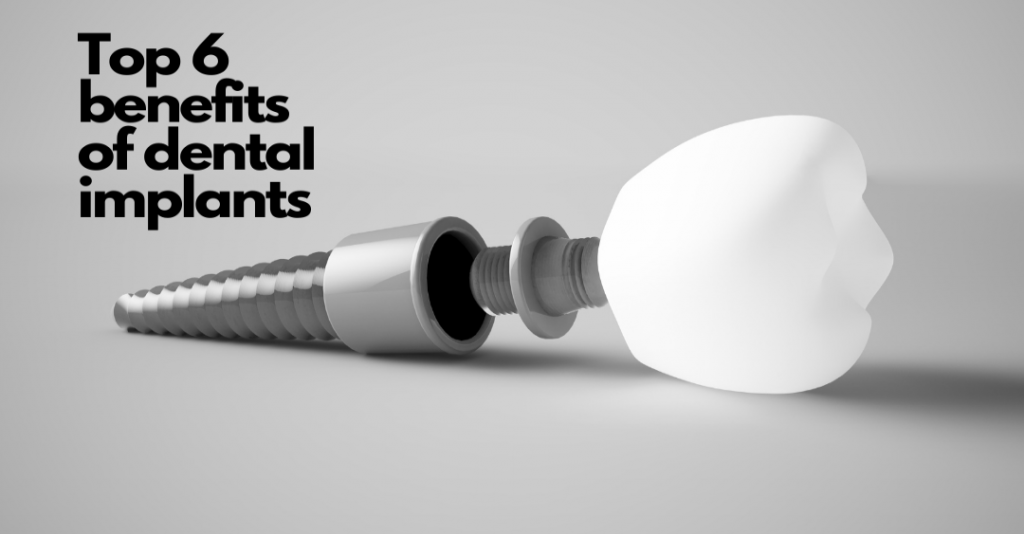
On top of the obvious benefit of replacing missing teeth and thus perfectly preserving the jawbone beneath, dental implants offer the following main benefits to patients:
- Improved appearance. Fixed teeth have the same look (even better) as natural teeth. Given that they fuse with the jawbone in time, they become a permanent solution to tooth loss.
- Regained confidence. Allows you to smile again in public without feeling self-conscious.
- Improved comfort. Owing to the fact that they are immovable, this eliminates the need to worry about misplacing your teeth, dislocating while wearing them and constantly worrying about adhesives to keep them in place.
- Mental health benefits. Recent research shows that links have been found between tooth loss and cognitive decline, meaning the longer you remain toothless or wear removable dentures, the higher your chances are to suffer from dementia.
- Easier chewing, normal tasting experience and digestion. Removable dentures can make one of our most important and basic needs a nightmare. Implants act like your own natural teeth and allow you to enjoy the taste of your favourite foods without any struggle.
- Have up to 98.5% success rate. Being biocompatible and one of the oldest materials used in healthcare, titanium poses little to no risks of failure as far as implantation is concerned.
Procedure
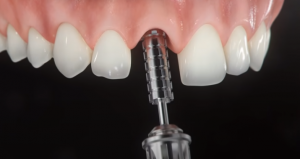 We have designed a comprehensive and hassle-free process for patients visiting the Dentaprime clinic in Stratford, London. The process begins with a thorough dental check-up that also involves a computer tomography scan – needed in order to assess your jawbone strength via 3D imaging and X-rays. After all the information about your oral status has been acquired, the principal surgeon prepares your personally tailored dental implant treatment plan. Once completed, you are invited to a personal discussion so that you could go over all aspects of the process, discuss the duration and how much your dental implants cost. During this discussion, you can also ask all your questions in order to make an informed decision.
We have designed a comprehensive and hassle-free process for patients visiting the Dentaprime clinic in Stratford, London. The process begins with a thorough dental check-up that also involves a computer tomography scan – needed in order to assess your jawbone strength via 3D imaging and X-rays. After all the information about your oral status has been acquired, the principal surgeon prepares your personally tailored dental implant treatment plan. Once completed, you are invited to a personal discussion so that you could go over all aspects of the process, discuss the duration and how much your dental implants cost. During this discussion, you can also ask all your questions in order to make an informed decision.
Having gone over all details regarding the implanted teeth and agreed to proceed with a treatment, you are assigned commencement dates.
A simple process to new fixed teeth would look like this:
- Extraction of remaining teeth (if medically indicated)
- Dental implantation
- Temporary bridge placement
The process is strictly individual and depending on the individual’s current oral condition and bone quality. Based on the specific case, some of the steps could be combined or skipped. For example – bone grafting/ sinus lift is only needed when the jaw bone strength is insufficient. This would be assessed during your onsite examination which can be scheduled either online or over the phone.
Cost
Implanting teeth cost varies per country, and the average for the UK can reach up to 2,000 GBP per implant. The excessive prices for implanted teeth are the main factor why many of the British choose to go with dental tourism and look for dental treatment abroad. Most are specifically after the cheapest option for implant treatment in countries like Turkey or Hungary.
Fortunately, Dentaprime F3T has worked long and hard to provide affordable dental implant solutions at the heart of London. With prices 3 times more affordable than the UK average, we eliminate the need to travel abroad for dental implants. Here is a price comparison showing how much to budget for dental implants depending on the location that you choose.
Follow-up, recovery and aftercare
Once the dental implantation has been completed, you are supposed to experience only minor discomfort. Here are a few common post-treatment irritations you need to be informed about:
- Minor bleeding
- Swelling of the gums
- Bruising on the face
Dentaprime F3T always provides a goody bag of antibiotics and painkillers to ensure smooth and pain-free recovery. Furthermore, you also get a clear list of post-operative care instructions which would need to be followed strictly in order to avoid any discomfort throughout the healing process. These involve tips on what kind of foods to consume, what activities to avoid, how to ensure good oral hygiene, etc..
Recuperating from the procedure may vary and is communicated clearly by your treating dentist at Dentaprime. Aftercare appointments are of vital importance in order to ensure a smooth recovery and long term success of the implantation. Titanium dental implants are known to be able to last for a lifetime if properly maintained.
Potential complications after treatment with implants
Given the modern technology and extensive knowledge about dental implantation procedures, nowadays complications are quite rare if done by a certified professional. This is why it is important to conduct thorough research of the background of the dental implantologist that you choose to conduct the treatment for you. Still here are three potential situations that may occur post-dental implantation.
Wobbly implants
After the dental implantation, at the beginning of the healing period, the implants will fuse together with the jawbone. This is called osseointegration, and it is vital to ensure the successful outcome of the treatment. In the event of implant failure, it may need to be removed and another implantation would need to be performed.
Receding gums
There have been known situations when the gum around the implant has started to recede, meaning the gum tissue around the implant begins to withdraw. As a result, severe pain and swelling may occur. It is of paramount importance to see your implantologist as soon as possible in this case. If your implants have been done abroad, this could lead to serious complications since some dentists in the UK may not be able to tackle a foreign implant.
Infections
In order to avoid infections, good oral care and proper implant maintenance is a must. Systematic failure to floss and brush could result in failure. Not cleaning properly the implant area would end with an infection. Elevated failure rates are also attributed to nicotine so smoking should be given a miss. The only thing you need to do is just treat your new fixed teeth as if they were your own natural ones – brush regularly and use a water pick.
Bringing it all together
21% of adults living in the UK have reported having trouble eating due to the poor state of their teeth or simply the lack of them. Dental implants are titanium (or zirconia) posts that are embedded in the jawbone designed to replace missing teeth and prevent bone loss. Titanium implants have a 94-97 % success rate and if properly cared for can last for a lifetime. They provide the same appearance and functionality as natural teeth.
The first step to getting dental implants is contacting an experienced implantologist in order to have a thorough examination carried out. After the check-up, computer tomography scan and X-rays have been done, you would be able to know the cost of the dental implants, the anticipated healing period, understand the process and get one step closer to your dream smile.


